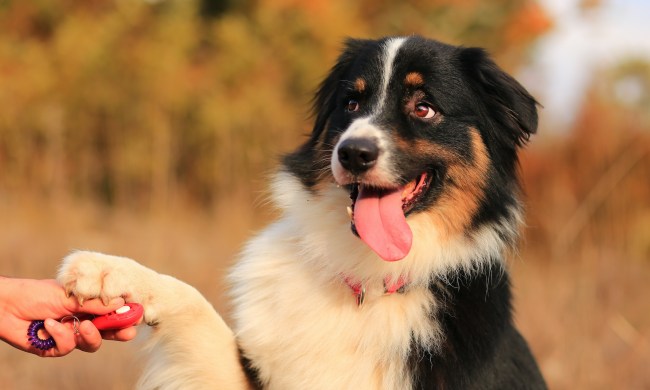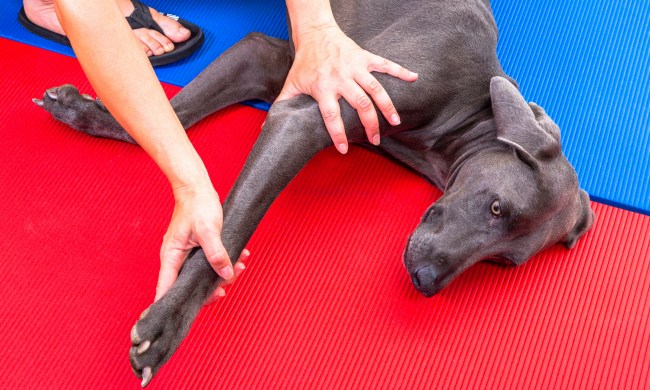
One of the best parts of dog ownership is having someone to comfort you when things feel tough, and we try to do the same for them. However, dogs can cry for all sorts of reasons, and it’s not always a good idea to indulge them. Sometimes you need to train your pup that crocodile tears won’t get them their way — when they cry to get out of the crate or to get a treat, for example.
On the flip side, you always should keep a watchful eye out for cries that indicate a deeper issue, like sudden pain or discomfort. So you know whether to turn a deaf ear or reach for your phone to call the vet, these are five of the most common reasons your pooch might cry.

Can dogs cry?
Let’s get this out of the way first: While your beastie has tear ducts, they aren’t actually shedding a tear when they cry. Instead, when we say cry, we mean whining or otherwise emoting loudly. Interestingly, the reason dogs cry is instinctual; just as it is in humans. They need to grab mom’s attention for food, warmth, or safety, as our babies do. When you become a pet parent, those needs transfer to you, and it’s therefore your responsibility to respond to the cries appropriately.

Why do dogs cry?
As we established, a puppy cry could have lots of origins. Just as you learn the other behaviors of your canine, you’ll pick up on his different cries early and have a better sense of what they want and need.
Pain
Sadly, one reason your little guy might whimper could be pain or discomfort. You’ll get a feel for this one when you accompany them to the vet and they get annual vaccines and might let out a little yelp or squeak. Of course, that’s a necessary evil and certainly doesn’t cause any excessive discomfort. In day-to-day life, watch out for other signs of injury, such as limping, digestive issues, or lying down and sleeping a lot. This is always a good time to call the dog doctor.
Sickness
Similar to pain, you could pick up on whimpers or whines and realize that it stems from an illness. Sometimes pups get the sniffles or a tummy issue that just needs some meds to fix up, but will cause discomfort, the same as it would in you. For more severe sicknesses, you will need to discuss pain management with his vet.
Anxiety
Mostly, we’re thinking about separation anxiety, the bane of many pet owner’s existence. Lots of beasties struggle with this if they have had a difficult past or weren’t trained appropriately. Unsurprisingly, the solution will often be more training and slowly practicing spending time apart. Other anxieties might present less acutely but no less annoyingly. For example, when you experience a big change in the household, your dog could respond with excessive crying. You’ll have to strike a balance of not overindulging while also trying to redirect them.
Boredom
Dogs get bored just like us. Luckily, there are a bunch of ways you can fix this. First, make sure they’re getting enough exercise every day. The exact right amount varies by age, size, and breed, but overall, most pooches require several walks, at least in the morning and evening. Already got that covered? Try adding play time to the daily routine. Throwing a ball around burns energy and uses some of your dog’s innate skills. Lastly, consider a puzzle toy or other game to occupy your pup’s time when you can’t provide your own attention.
Hunger
Some animals will make a big fuss when they think it’s dinner time (while others barely seem to notice). For the most part, you don’t need to make any substantial changes if your pup cries a little for dinner. It can stick to a schedule; you might try switching to more meals per day by feeding them lunch, for example, in addition to breakfast and dinner. Rarely, medical conditions can cause excessive hunger, in which case your vet will intervene. If you’ve noticed anything like this, bring it up at your next appointment.
Your dog cries to get your attention and communicate their need, but that doesn’t mean you have to listen to it all the time. Once you take a good look at the situation and determine the cause, you can work to fix the underlying issue by introducing more training, shaking up their schedule, or taking them to the vet to diagnose a medical problem. Some crying should just be straight-up ignored when it’s for seemingly no reason and only to get your attention (note: also the big puppy dog eyes). Understanding the different cries will help both you and Fido feel better.



